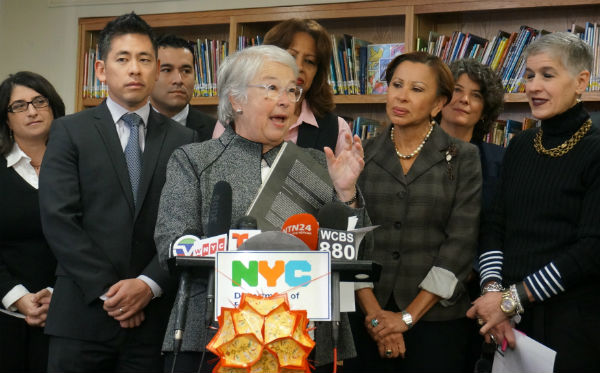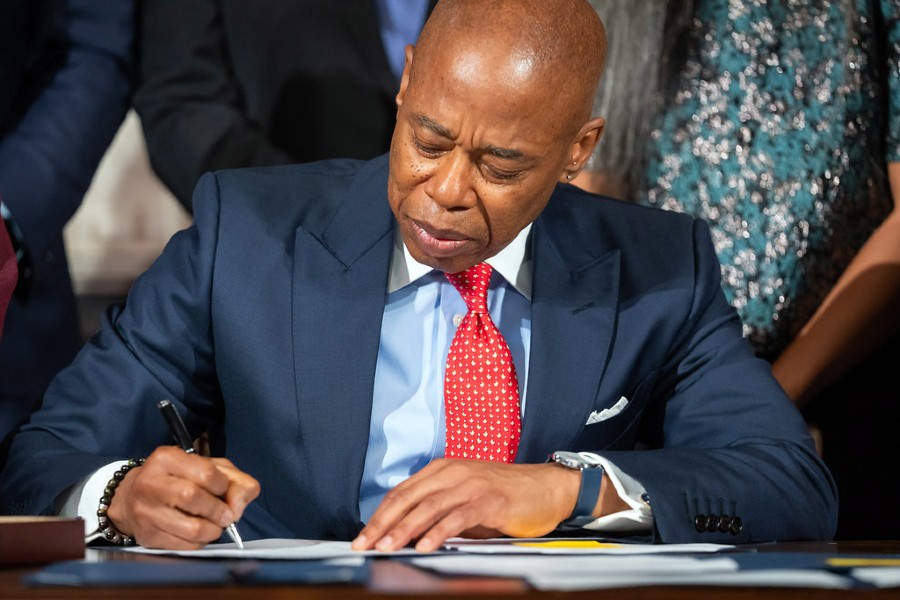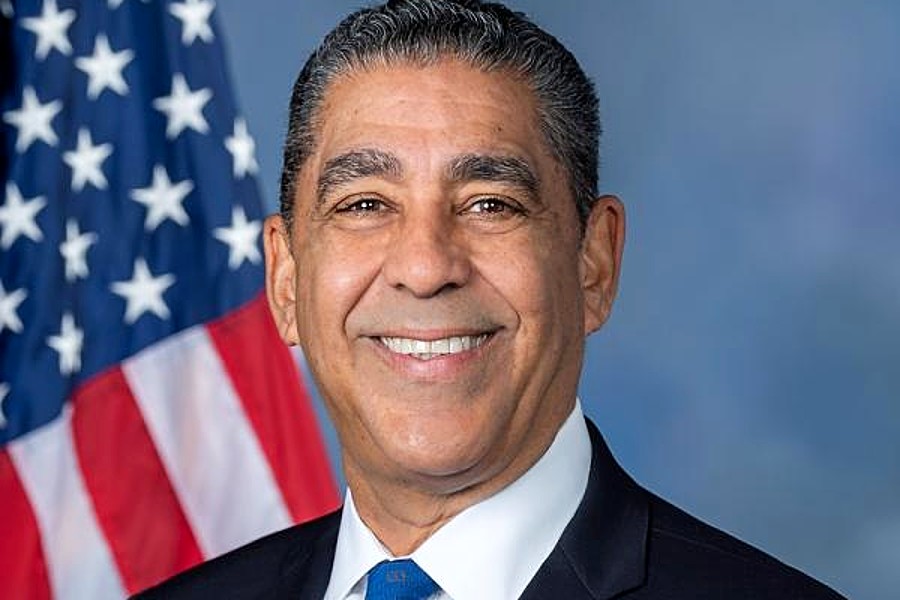 Schools Chancellor Carmen Fariña today announced the expansion of language access services with the creation of nine new positions in the Borough Field Support Centers and Affinity Groups.The new Field Language Access Coordinators will ensure that schools are providing parents with limited English proficiency with full access to translation and interpretation services available to them in schools.
Schools Chancellor Carmen Fariña today announced the expansion of language access services with the creation of nine new positions in the Borough Field Support Centers and Affinity Groups.The new Field Language Access Coordinators will ensure that schools are providing parents with limited English proficiency with full access to translation and interpretation services available to them in schools.
The expansion also includes new direct access to over-the-phone interpreters for schools, available after 5 p.m. for the first time, as well as a substantial increase in the translation and interpretation supports the DOE provides to Citywide and Community Education Councils.
Led by the Translation and Interpretation Unit, the expansion revamps the way in which the DOE communicates with families with limited English proficiency. The Field Language Access Coordinators will ensure every school has a designated and trained Language Access Coordinator (LAC) in place and determine whether schools are addressing the language access needs of their parents. The nine Field Language Access Coordinator positions will be based in the seven Borough Field Support Centers (BFSC), with an additional position in the Bronx BFSC and one assigned to the Affinity Groups. There are more than 1,500 LACs across our city’s schools. The Translation and Interpretation Unit has provided ongoing training to hundreds of LACs since the fall of 2013 on how to maximize the provision of language services to parents.
“New York City represents a wealth of different cultures, languages, traditions, and beliefs. This is an important step forward and I want to thank all of the advocates, community members and elected officials who continue to work closely with us to ensure that there are no language barriers between students and families and a great education,” said Schools Chancellor Carmen Fariña. “Increasing translation and interpretation services to families is a top priority, and a critical part of building strong relationships between schools and communities.”
As of December 2015, the DOE is providing schools with direct access to over-the-phone interpreters. In the past, schools had to contact the Translation and Interpretation Unit which then connected the call – a step that has been eliminated. This will help reduce wait time for an interpreter and allows teachers and staff to call non-English speaking families after business hours. Interpreters are available in 200 languages. In the first month alone, over 1,500 calls were made from schools requesting language support in 43 languages.
Starting this month, Citywide and Community Education Councils will also receive additional language support. The Translation and Interpretation Unit, now under new leadership at the DOE’s Office of Communication and External Affairs, will expand translation support beyond notices and agendas to include resolutions and bylaws, and interpretation support beyond scheduled, special and business meetings to cover committee and annual meetings. Further, Education Councils needing additional support for members with limited English proficiency will now be able to access over-the-phone interpretation services.
“Being able to communicate with parents and guardians in a language they understand and in a timely fashion is key to our work with parents,” said Maite Junco, Senior Advisor for Communications and External Affairs, whose office now oversees the Translation and Interpretation Unit. “We are proud to work jointly with advocates, parents, parent leaders and educators to expand and improve the way we provide language services to our parents with limited English proficiency. We look forward to our continued partnership.”
“As the head of family and community engagement, it is my priority to find and remove barriers to parent engagement in our schools. These improvements to language access are great examples of the results we continue to expect from our ongoing collaboration with advocates and education councils,” said Yolanda Torres, Executive Superintendent of the Division of Family and Community Engagement. “Having Field Language Access Coordinators will allow us to shine a light on schools with the best strategies and to develop tailored supports for those that struggle.”
“Parents, grandparents and guardians should feel welcomed in our City’s schools and I am committed to strengthening partnerships between our schools and families through language access,” said Kleber Palma, Director of the Translation and Interpretation Unit. “This expansion allows us to closely assess each school’s language access capacity and provide teachers, principals and staff with tailored supports and services they need to communicate with families effectively
The Chancellor made this announcement at PS/MS 126 in Manhattan, where nearly 80% of the student population speak a language other than English at home.
“Expanding language access services to our families with limited English proficiency means better communication and welcoming families as true partners in the education of our City’s children,” said PS/MS 126 Principal Jacqueline Getz. “Involving families in our PS/MS 126 community is important to the success of our school and I am excited the DOE has continued to make all families – regardless of their native language – a top priority.”
“Today marks a huge victory for New York immigrant communities and for the NYIC’s Education Collaborative, whose members have worked tirelessly over the last year to ensure that access to competent translation services is provided in all New York City public schools,” said Steven Choi, Executive Director of the New York Immigration Coalition. “The announcement that there will be nine new Language Access Coordinators across each Borough Field Support Center in the city is a sign of our success and a testament to what can be achieved when immigrant communities and the DOE work together for a common goal: to ensure the success of immigrant students and their families. These new roles will determine the specific needs of each school and build the necessary supports so that parents receive quality translation and interpretation services. On behalf of the Education Collaborative and the Build the Bridge Campaign, we celebrate this victory and thank the DOE for their continued efforts to improve services for immigrant families all across New York City.”
“We must remove all language barriers between parents, teachers and school staff if our students are to receive the best education possible,” said NYC Council Education Committee Chair Daniel Dromm. “I commend Chancellor Fariña for this language access service expansion which will ensure that parents with limited English proficiency are able to communicate with school leadership and advocate for their children’s academic well-being. I will continue to work with the DOE and my colleagues in government to make the public school system more accessible to all New York families.”
“Communicating with our public school families with limited English proficiency in a timely fashion is crucial and these initiatives are a step forward to ensuring we reach every parent regardless of their native language,” said Congresswoman Nydia Velazquez. “I welcome this expansion of services and look forward to working with the Chancellor to ensure this initiative is implemented successfully.”
“Improved language access is something I’ve vigorously fought for in Congress from translating Free Application For Student Aid (FAFSA) forms into additional languages to creating more dual language programs for City schools,” said Congresswoman Grace Meng. “This expansion of language access will be a tremendous help to parents who speak limited or no English, and I applaud the Chancellor making these improved services available to parents. New York City – and my district in particular – is the most diverse place in America with people from all around the world speaking many different languages. All parents – regardless of how proficient they are in English – are entitled to the same resources that help their children succeed in school and, more access to interpreters and translations will help accomplish that critical goal. Language barriers must not also cause education barriers!”
“Nearly half of public school families speak a language other than English at home, and for too long these families have been told they don’t have a role to play in their child’s education because of a lack of access to translation and interpretation services,” said Manhattan Borough President Gale A. Brewer. “I welcome this expansion of services and look forward to working with the Chancellor, the Borough Field Support Centers, our Community Education Councils, and parents to ensure this initiative is implemented successfully.”
“Expanding language access and interpreting services is great news for our entire City, because it means a school system that reflects our city’s values,” said State Senator Daniel Squadron. “I thank Chancellor Fariña and the DOE for this step to make schooling more accessible for more families.”
“It is incredibly important that every part of this administration understands, and is committed to language access for all New Yorkers. This announcement is a real step toward inclusion of parents who may understand language as a barrier, but who are wholly interested in the success of their students. I congratulate Mayor de Blasio, Chancellor Fariña, and the entire team for leading on language access in education,” said Carlos Menchaca, NYC Council Immigration Committee Chair.
“This broad expansion of language access services is the result of our City’s commitment to ensuring that all parents, including those with limited English proficiency, are able to participate in their child’s education,” said Council Member Margaret Chin. “I thank Chancellor Fariña for recognizing the importance of translation and interpretation services in building bridges between immigrant communities and our City’s schools.”
“CHCF congratulates Chancellor Fariña and the DOE for the investment made in our non-English speaking families and their students,” said Grace Bonilla, President/CEO of The Committee for Hispanic Children and Families, Inc. “The new Field Language Access Coordinators are a strong step forward to create accountability, ensure that our schools are communicating with our non-English speaking parents in the language they understand and fix problems when they arise. We have worked closely with the DOE on this and I commend their efforts to improve language access services across the system.”
“The Coalition for Asian American Children and Families (CACF) commends Chancellor Fariña for the new support system, including designation of a new Language Access Coordinator, in Borough Field Support Centers,” said Sheelah Feinberg, Executive Director, Coalition of Asian American Children and Families. “Currently, one out of five Asian Pacific American (APA) youth is an English Language Learner, and APAs in NYC have the highest rates of being foreign-born at 80%. Providing the adequate translation and interpretation resources means more immigrant parents will proactively engage in their children’s education.”
“Today, immigrant parents in the Arab-American community feel reassured that the DOE heard their concerns and is actively enhancing language access to all communities,” said Linda Sarsour, Executive Director of the Arab American Association of New York. “The newly appointed language coordinators will play an integral role in helping immigrant parents fulfill their roles as active participants in their children’s education and future.”
“In order for immigrant parents to fully engage and participate in the education of their children, it is absolutely critical that they have access to high-quality interpretation and translation in schools. Immigrant parents have the motivation and willingness to participate and want to support their children academically, but do not always feel informed,” said Aracelis Lucero, executive director of MASA. “The NYC Department of Education’s addition of nine new Language Access Coordinators is a step toward ensuring full language access in NYC public schools, and ultimately increased parent engagement in schools. We are proud of the brave, resilient immigrant parents who organized to propel this change forward, as well as members of the NYIC Education Collaborative who supported the Build the Bridge Campaign, and we commend the NYC DOE for this promising first step.”
“Our work with Chinese immigrant parents and students has shown us that translation and interpretation needs even within the Chinese community can be complex, differing from neighborhood to neighborhood, from school to school,” said Mae Lee, Executive Director of the Chinese Progressive Association. “We welcome the NYC Department of Education’s effort to address this issue with the borough-wide language access coordinators.”
“It is so wonderful to learn that our asks to the Department of Education were granted and that my involvement in this effort has paid off,” said Etifaq Musleh, a parent affiliated with the Arab American Association of New York. “I am looking forward to the positive changes that the language access coordinators will bring to the table. In particular, I am looking forward to receiving accurate Arabic translations to our homes which will ensure that we are informed and are able to engage more with our children’s education. I am mostly happy for my kids because now I know that there are nine coordinators who will make sure our needs as immigrant parents are met sufficiently.”
Via Chancellor Carmen Fariña Press Release
Photo Caption: Chancellor Carmen Fariña announces the expansion of language services to parent with limited English proficiency at PS/MS 126 in Manhattan. Photo Credit: Courtesy of China Press.
Become a Harlem Insider!
By submitting this form, you are consenting to receive marketing emails from: . You can revoke your consent to receive emails at any time by using the SafeUnsubscribe® link, found at the bottom of every email. Emails are serviced by Constant Contact








